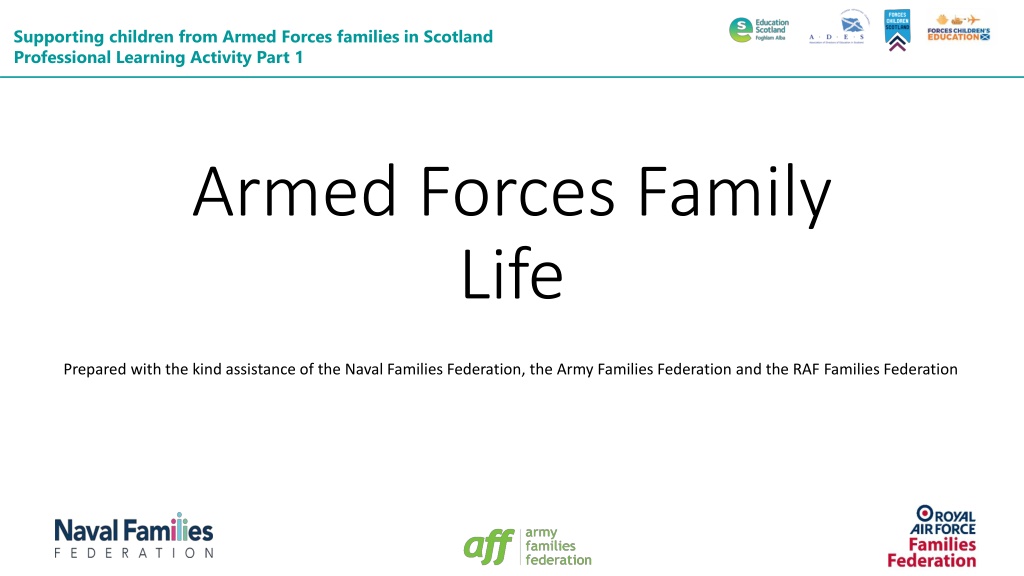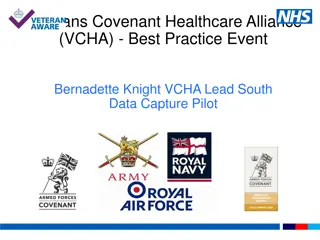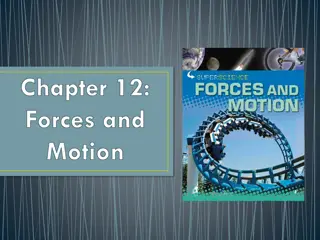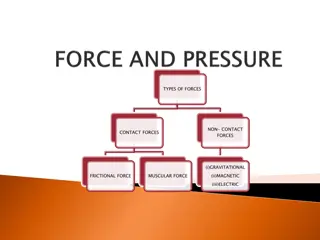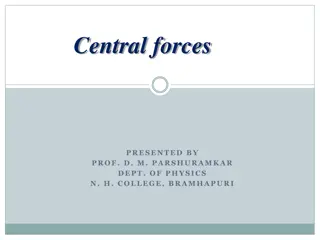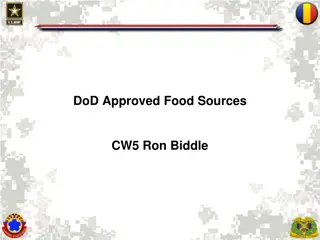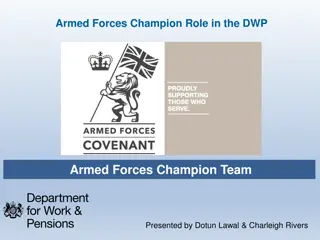Armed Forces Family Life
The Armed Forces family life involves continual mobility and various deployments, impacting the entire family. Despite challenges, it offers a sense of community, diverse cultural experiences, and opportunities for skill development in service children. The quality of life for military spouses is highlighted, showcasing strengths and positives in the face of constant change and separations.
Download Presentation

Please find below an Image/Link to download the presentation.
The content on the website is provided AS IS for your information and personal use only. It may not be sold, licensed, or shared on other websites without obtaining consent from the author. Download presentation by click this link. If you encounter any issues during the download, it is possible that the publisher has removed the file from their server.
E N D
Presentation Transcript
Supporting children from Armed Forces families in Scotland Professional Learning Activity Part 1 Armed Forces Family Life Prepared with the kind assistance of the Naval Families Federation, the Army Families Federation and the RAF Families Federation
The notion of 'Service First' 'Service comes first' is a principle that affects the whole family's life, not just the Service person. W What is hat is unique about unique about Armed Forces Armed Forces family life? family life? Mobility Some can move houses as much as every 18 months/2 years, some every 5 years or so, others settle in one place whilst a Serving person moves around for work Deployment Non-operational and operational deployments, in the UK or overseas, can vary in length and frequency. Some will be often for a few weeks/a month, others for 4-6 months every couple of years. Some may even be 9 months or longer. Separation takes different forms. Can be from training, living apart, and/or deployment and will hence vary in length and frequency. Image by skeeze on Pixabay
"I 'married in' to the Armed Forces 19 years ago...... In that time I ve had 2 children, 4 cats, 13 houses and 7 jobs. During that time I ve had to find 4 childminders, 3 nurseries and 6 schools for the children, 13 GPs and 8 dentists (I didn t bother for a few years) I ve given birth in 2 different hospitals Had 19 hairdressers Moved house .sometimes when we wanted and to where we wanted but also at short notice, completely the wrong time and a location that would have been the last place in the world we would have chosen. Moved overseas and moved back again. Lived together. Lived apart. Kissed him goodbye on deployment 8 times and several months later hello Made half a dozen life long friends And myself and the children have left behind many more good ones along the way." One One example.... example....
Quality of life: 61% of military spouses are satisfied with their quality of life being married to a member of the Armed Forces (FAMCAS 2020). Different cultures & backgrounds: The AFF 'Listening to our service children' survey reports that families said Army life offered children the chance to make new and diverse friends from different cultures and backgrounds. It also built skills such as resilience, confidence and tolerance. What are the What are the positives positives of of service service family life? life? family Community:for many families, this is a key benefit which is mentioned frequently in our surveys, the chances to make friends, live with other families and children going through the same experiences, especially during deployments, separation, remote living, constant moves and unknown change. Development of skills: The NFF's report 'The Experience of Parental Absence in Royal Navy and Royal Marines Families' lists specific skills including independence, maturity, flexibility and awareness of civic duty that service children may develop due to separation.
Families in some parts of the Armed Forces can be quite mobile moving with the Service person from as little as every 18 months to every 5 years or more. Each move brings challenges around access to healthcare, childcare and education and changing friendships for the whole family. Each move means finding new medical practices, education settings and for many spouses and partners finding new employment too. How do we live? How do we live? Mobile Armed Forces Mobile Armed Forces families families For some this has its advantages as it can offer opportunities to live somewhere new, be part of new communities and have the opportunity to meet a variety of people. These challenges can be greater for Dual serving or single parent serving families, where the access to immediate support especially surrounding childcare is less flexible.
Some families do not move with their serving family member but remain in one place whilst their Service Person commutes, sometimes opting to live at his/her unit during the week (sometimes called 'weekending'). This pattern is most common for Naval families and increasingly, for RAF families (https://nff.org.uk/non-operational- separations/) How do we live? How do we live? - - Dispersed family Dispersed family living living This reduces disruption for the rest of the family especially on education, spousal employment and healthcare. There are pros and cons to this option too read more in the Dispersed Living Report from the RAF Families Federation (https://www.raf-ff.org.uk/wp- content/uploads/2019/02/Dispersed-Families-FOR-WEB.pdf) If they are living dispersed, families may be more dependent on support from their school as there is no other local welfare support available. There are a large number of dispersed families in Scotland, as well as many families living near military units.
Armed Forces family living Armed Forces family living some facts and figures from the Ministry of some facts and figures from the Ministry of Defence Defence (Armed Forces Families Continuous Attitude Survey 2020) (Armed Forces Families Continuous Attitude Survey 2020)
What are the What are the challenges challenges faced families? families? What do they say? What do they say? faced by by I don t want to make any new friends because you re just going to move us again AFF, Childcare Survey UK Tri-Service Families Continuous Attitude Survey Results 2020
One in five families with school age children had at least one child change schools for Service reasons in the past year (FAMCAS 2020). Mobility brings multiple challenges (see next slide), including: Disruption of friendship groups and family support networks Lack of continuity in education (different schools systems/curricula/exam boards) Variations to the amount and type of support available, particularly for those with The education The education challenges for challenges for families and families and Service children Service children additional needs 89% of Army families participating in the "Listening to Our Service children" survey (2019) reported considering leaving the Army because of the impact of Service life on their child. Many children will be repeatedly separated from one or both parents, sometimes for periods of months or even years where a parent is serving unaccompanied overseas (see https://nff.org.uk/parental-absence/) Not all operational activity receives media coverage. Some children will have parents working in high-risk situations and will be concerned about their parent/s safety. Every Service child s experience is unique.
Supporting children from Armed Forces families in Scotland Professional Learning Activity Part 2 Armed Forces Family Life Prepared with the kind assistance of the Naval Families Federation, the Army Families Federation and the RAF Families Federation
What would be useful for educators to know about Service children?
How are families supported? By whom? Military Charities Over 187 offer support e.g. The Royal Navy and Royal Marines Charity The Army Benevolent Fund, RAF Benevolent Fund and Royal Air Forces Association Royal British Legion SSAFA Families Federations Each Service has its own Families Federation that acts as an independent voice for families and offers support and advice. Service family Networks in the UK Service Children s Progression Alliance, Service Children in State Schools (England only) Supporting Service Children in Education in Wales, Veterans and Family Research Hub, Anglia Ruskin Uni Single Service Family Support (welfare support and social work): Royal Navy Family People Support (RNFPS) Army Welfare Support RAF Community Support (social work through SSAFA) Scotland Specific Support Royal Caledonian Education Trust www.rcet.org.uk National Transitions Officer, ADES www.forceschildrenseducation.org.uk
For further information: Anna Hutchinson Lisa Thipthorp Wendy Quinn Education and Childcare Specialist Army Families Federation Operations and Policy Manager RAF Families Federation Families Engagement Officer, Scot & NI Naval Families Federation wendy.quinn@nff.org.uk educationsupport@aff. org.uk lisa.thipthorp@raf- ff.org.uk
